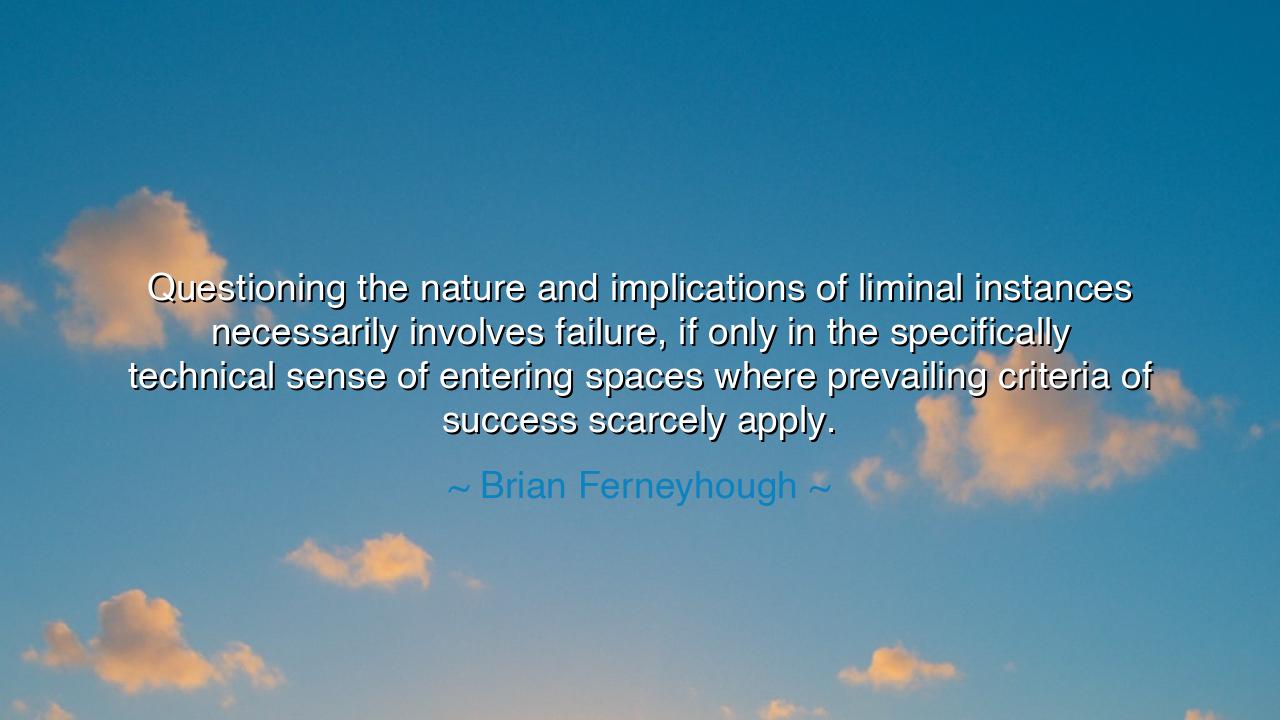
Questioning the nature and implications of liminal instances
Questioning the nature and implications of liminal instances necessarily involves failure, if only in the specifically technical sense of entering spaces where prevailing criteria of success scarcely apply.






Host: The soft glow of the evening enveloped the room, a calm stillness that mirrored the depth of the conversation. Jack sat at the table, his fingers resting lightly on his cup, reflecting on Brian Ferneyhough’s words. Jeeny stood near the window, her gaze directed outward, considering the complex layers of the statement.
Jeeny: “I’ve been thinking about what Brian Ferneyhough said: ‘Questioning the nature and implications of liminal instances necessarily involves failure, if only in the specifically technical sense of entering spaces where prevailing criteria of success scarcely apply.’ It’s such an interesting way to think about failure, isn’t it? The idea that by stepping into unknown or uncharted spaces, spaces that don’t fit within the traditional frameworks of success, you’re bound to encounter failure—if only because the usual criteria don’t apply there.”
Jack: “Yes, exactly. Ferneyhough is showing us that failure isn’t always a negative. In fact, it’s almost a necessary part of venturing into new, unexplored territories. When we challenge the conventional, we inevitably face moments of discomfort, where the rules we typically follow no longer work. It’s in those spaces—those liminal moments—that growth happens, but it requires stepping away from what’s safe, from what’s already been defined as success.”
Jeeny: “Right. And it’s also about pushing boundaries. Ferneyhough is saying that real innovation happens when we leave behind the familiar and enter places where the usual measurements of success don’t make sense. It’s not about following a formula for success—it’s about being willing to explore the spaces where we might not have all the answers, and where the journey itself is more important than the outcome.”
Host: The stillness in the room deepened as they reflected on the concept of liminal spaces—those moments of transition where the conventional rules and expectations no longer apply. Jack’s fingers rested on the table, while Jeeny’s expression softened, considering how stepping into the unknown can often mean embracing failure, not as defeat, but as a necessary part of discovery.
Jack: “It makes me think about how we often approach success with a fixed idea of what it should look like—there’s a formula we follow, a path that’s already been mapped out. But Ferneyhough is challenging that. He’s suggesting that real creativity and innovation don’t always fit within those neat parameters. When we step into new and uncertain territories, we can’t be afraid of failure. Instead, we have to embrace it as part of the process.”
Jeeny: “Exactly. And I think Ferneyhough is also showing us that failure in these spaces isn’t a setback—it’s a learning experience. The liminal space, where the usual rules don’t apply, is where we get to redefine what success even means. It’s about exploring new ways of thinking and creating, and sometimes that involves not knowing where the finish line is, or even what it looks like.”
Jack: “And I think that’s the challenge, isn’t it? Failure in this context isn’t about falling short of a goal—it’s about not even knowing what the goal is in the first place. When you venture into spaces where traditional criteria don’t apply, there’s no clear roadmap. It’s about being comfortable with uncertainty, and trusting that the journey is what matters, not the predefined outcome.”
Jeeny: “Exactly. It’s also a reminder that progress isn’t linear. Ferneyhough suggests that sometimes, to move forward, you have to be willing to step into spaces where you might not immediately succeed, where failure is inevitable, but it’s a stepping stone to something greater. And the only way to move forward is by embracing that uncertainty.”
Host: The quiet in the room grew deeper as they reflected on the profound truth of Ferneyhough’s statement. Failure isn’t always something to fear; sometimes, it’s a necessary part of the creative and innovative process, especially when we venture into the unknown, where traditional rules of success don’t apply. Jack leaned back slightly in his chair, while Jeeny’s gaze turned from the window back to him, both of them understanding the importance of embracing uncertainty and failure as part of the journey toward innovation.
Jack: “So, Ferneyhough is really showing us that failure isn’t always a bad thing—it’s often a necessary step when we venture into spaces that don’t follow the traditional path. Real growth happens when we’re willing to step off the beaten path, even if we don’t know where it’s leading.”
Jeeny: “Exactly. It’s about exploration and being open to the unknown. Ferneyhough reminds us that sometimes, we need to be comfortable with uncertainty and failure, because that’s where true innovation happens. The spaces where traditional measures of success don’t apply are the spaces where we can create something new.”
Host: The evening had fully settled in, the quiet understanding between them a reminder that growth and creativity often require stepping into unknown spaces, where failure may be inevitable but is also necessary for deeper discovery. Brian Ferneyhough had shown them that the key to real innovation is embracing the liminal spaces, where traditional success criteria don’t apply, and trusting that failure is part of the process. The world outside had darkened, but inside, there was light—a recognition that failure is often the gateway to progress and true creative growth.






AAdministratorAdministrator
Welcome, honored guests. Please leave a comment, we will respond soon